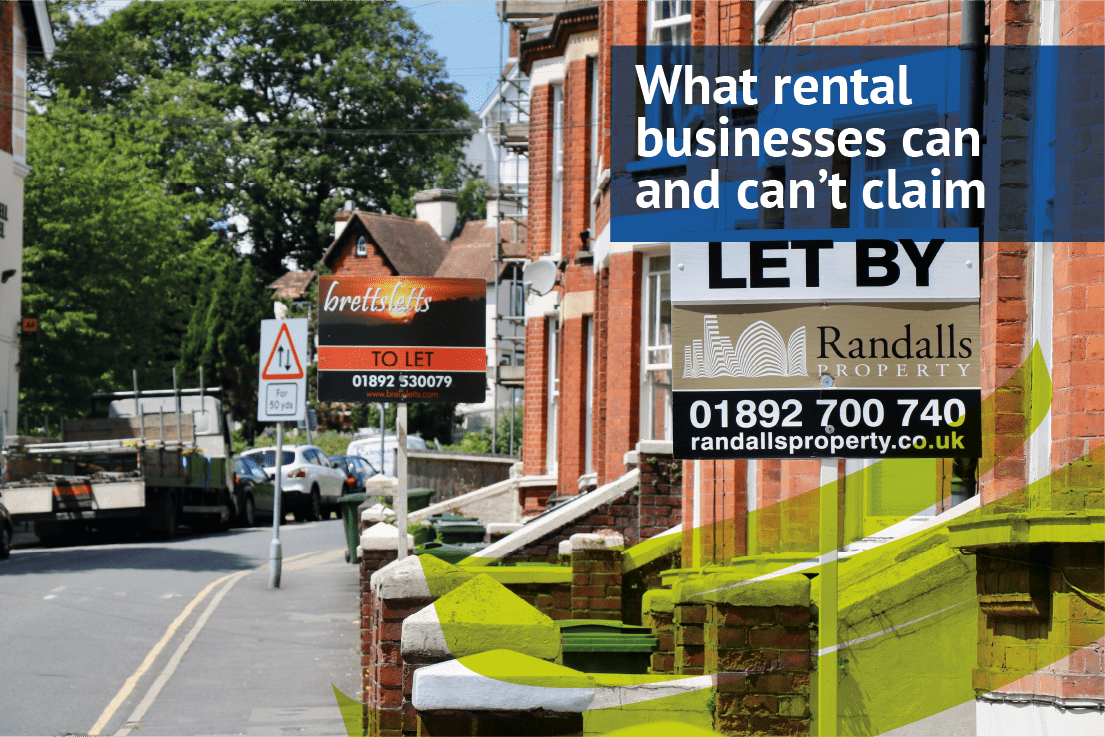What rental businesses can and can’t claim
11th December 2019
Understanding what what rental businesses can claim and what is allowable for your property can be a grey area. Read on to clarify your situation and ability to claim.
Revenue or capital?
It’s important to understand the difference between revenue and capital expenses when working out what rental businesses can and can’t claim tax relief on.
Generally speaking, and subject to certain other rules, expenses that are REVENUE in nature can be offset against rental income, whereas expenses that are CAPITAL in nature will be offset against the proceeds of a future disposal.
In the instance where you had bought a property and carried out some basic decoration before leasing then you could classify this as revenue expenditure. However, a greater investment in transforming the property that added to the value would usually classify as capital expenditure. It is important to keep any records and invoice copies for any capital expenditure as they will all be eligible for Capital Gains Tax Relief.
Remember, not everything is an expense!
Common thinking among landlords is that any investment made on a property can then be offset against any income from rental. However it should be remembered that:
- Not all expenditure classes as relief-qualifying
- Some expenditure can only be claimed at the point of selling the property
- Some investment can be deducted from rental income when taxable income is being calculated
- Some expenditure isn’t eligible to be a deduction but other guidance may apply
What can rental businesses claim?
To be tax deductible against your rental income the expense must be revenue in nature and incurred wholly and exclusively for the purpose of renting the property. Below are some examples of expenses that may be tax deductible:
Maintenance and Repairs
So long as any repairs do not class as a capital improvement then they can be claimed for. If you were a resident in the property before leasing it then this would not be eligible as it would class as private use maintenance.
Professional Services Fees
If there are any legal expenses that were incurred due to the lease renewal, evictions, collection of rent or a short-term tenancy of up to a year then these are eligible as expenses, along with other professional services such as accountancy charges.
Service Charges
Any service charges such as grounds upkeep can be claimed for and utilities can be claimed for any furnished holiday lettings.
Wages
Wages are an allowable expense; however, if you are employing someone then you will need to ensure that you meet all current employment legislation such as Minimum Wage and Working Time Directive. The National Minimum Wage for 2019/20 for employees over 25 is £8.21.
Interest and other finance charges
If you were a private landlord before April 2017 with a mortgage on your property, any interest you paid towards the mortgage payments could be deducted from your rental income before you paid tax on it. However, HMRC has been gradually introducing new rules on buy-t0-let properties phasing out this relief and replacing it with a new 20% tax credit.
During the transition period, the percentage of your mortgage interest payments that landlords can deduct from their rental income has decreased by 25% each year, while the portion of interest payments that qualify for the new tax credit has increased by 25% each year.
Until April 2020, you can still deduct 25% of mortgage interest payments from your rental income, while 75% of payments qualify for the new 20% tax credit.
From April 2020, finance costs will no longer be an allowable expense and 100% of your mortgage will attract the new tax credit.
Basic rate (20%) taxpayers should see no change to their liabilities and commercial properties and furnished holiday lettings will not be affected by the changes.
Insurance
Insurance premiums for the buildings and/or contents are eligible.
Council Tax and Rates as well as any Ground Rent
All of these can be claimed for if you pay them rather than your tenant – this includes any “gaps” where the property isn’t leased.
General Office/Admin Costs
Any reasonable expenses in this respect can be claimed such as telephone charges, envelopes and paper.
Replacement Furniture Relief
In 2016 the prior Wear and Tear allowance was removed. Since this date, for any “like-for-like” replacement of white goods and furniture can be claimed for, so long as Rent-a-Room relief is not claimed for and the property isn’t a furnished holiday letting.
Can rental businesses claim on purchase costs?
Unfortunately, all expenses when buying your property, such as survey charges, legal fees and stamp duty can not be classed as an eligible expense against any rental income, as they are linked to the purchase price. However, they can all be used as allowable expenses against any Capital Gains Tax liability when the property is sold so you should keep a record of these, though they will not be claimable in the event that the purchase doesn’t go through unfortunately.
What about private use?
For all periods for which a property is used for private purposes, then you should alter the claim for any allowable expenses. This includes maintenance carried out before you started renting it following private use.
Talk to the experts
There are opportunities for reducing both your Income Tax and your Capital Gains Tax on your rental properties, so you should always be aware of the invoices and receipts to keep in this respect. We always recommend seeking professional advice on calculating your allowable expenses. Contact us to speak one of our experienced tax team members.





